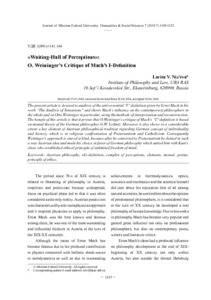«Waiting-Hall of Perceptions»: O. Weininger’s Critique of Mach’s I-Definition
Скачать файл:
URI (для ссылок/цитирований):
https://elib.sfu-kras.ru/handle/2311/13218Автор:
Niz’eva, Larisa V.
Низьева, Л.В.
Дата:
2014-07Аннотация:
The present article is devoted to analysis of the anti-essential “I”-definition given by Ernst Mach in his work “The Analysis of Sensations” and shows Mach’s influence on the contemporary philosophers in the whole and on Otto Weininger in particular, using the methods of interpretation and reconstruction. The benefit of this article is that it proves that O.Weininger’s critique of Mach’s “I”-definition is based on monad theory of the German philosopher G.W. Leibniz. Moreover it also shows to a considerable extent a key element of Austrian philosophical tradition regarding German concept of individuality and history, which is in religious confrontation of Protestantism and Catholicism. Consequently Weininger’s approach is one-of-a-kind, because after he converted to Protestantism he denied in such a way Austrian idea and made his choice in favor of German philosophy which united him with Kant’s ideas who established ethical principle of unlimited freedom of mind Статья посвящена анализу критики Отто Вейнигером анти-эссенциалистского понятия «Я», данного Эрнстом Махом в его работе «Анализ ощущений». Отмечается, что критика О. Вейнингером махистского понятия «Я» основана на учении немецкого философа Г.В. Лейбница о монадах, а также что она в значительной мере отражает особенность австрийской философской традиции относительно германского концепта личности и истории, которая заключается в религиозном противоборстве протестантизма и католицизма. Уникальность Вейнингера состоит в том, что, приняв протестантизм, он таким образом отказался от австрийской идеи и сделал выбор в пользу немецкой философии, объединившей его с идеями Канта, который утвердил этический принцип предельной свободы разума

